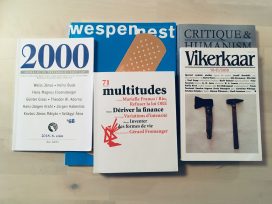Abstracts Multitudes 25 (2006)
Gilles Deleuze
De Sacher-Masoch au masochisme
Masochism is inseparable from the contract; but even while projecting it on the dominatrix, it pushes the contract to the extreme, takes its mechanisms apart, maybe even renders it ridiculous.
Christian Kerslake
Insectes et inceste. Bergson et Jung chez Deleuze
Jung’s advance, for Deleuze, must lie in this identification of a “problematic” zone of human intelligence, through which the instinctual form of consciousness can return. A gap is opened up for the return of an “instinct devenu désintéressé, conscient de lui-même, capable de réfléchir sur son objet et de l’élargir indéfiniment” (Bergson).
Régis Michel
L’Anti-Masoch. Essai sur les errements de la maso(miso)analyse
Masochism brings Freud up against the accursed share of analysis, which was always the female. Masoch undermines the epistemological apparatus of the Freudian unconscious, which could reinvent sex, but not the world: it gives way to the old demons of metaphysics, where the death drive triumphs. The return of the repressed.
Éric Alliez
Deleuze avec Masoch
Masoch emerging from the Text for a Life-Experiment: what Deleuze delivers to us is a political programme, because “there is no danger other than the father’s return”.
François Zourabichvili
Kant avec Masoch
The Presentation of Sacher-Masoch is Deleuze’s boldest establishment of the three-way relation Art-Desire-Law, rich with consequences in the attempt to find new foundations for critique. Rather than trying to rethink Kant with Sade, Deleuze chose to rethink Kant with Masoch, treating the latter as a therapist as well as an artist.
Frédéric Neyrat
Formuler notre surexposition. Entretien
By helping us recognize our historical moment as one of “over-exposure” – understood both in the sense of the vain images that blind us with their excess brilliance, and in the sense of bodies exposed without protection to the risk of hostile radiation – Frédéric Neyrat invites us to “bear the world’s emptiness” and to look to “letting-be” for a rampart against overflowing production. It’s time to invent an “ontopolitics of atopic subjects”.
Erwan Lecoeur & Alexandre Pessar
Les Yes Men : de l’usage de la “rectification d’identité” pour Bhopal
The actions of the Yes Men combine happenings with take-over strategies. Starting with websites, they continue the hoax till it runs into reality: in TV studios or with lectures they make sure to catch on film. This time, Dow Chemical takes a hit.
Andrea Natella
Aux origines de l’usage subversif du canular en Italie
The true is a moment of the false. Overview of the hoax in Italy, from Censor (1975) to Luther Blissett.
Luther Blissett
Le Gai Mensonge de Luther Blissett
Don’t hate the media, lie to the media. Defence and illustration of lying by the Italian Luther Blisset collective.
André Gattolin
Serpica Naro : le hoax des précaires contre le système de la mode
The young designer Serpica Naro is the center of attention during Fashion Week. But she doesn’t exist. A collective of flexworkers created her from scratch, to have a laugh at the city of Milan whose blood is sucked dry by the fashion vamp. And to show its dark side too: extreme precarity, with three-quarters of those under 35 working on short-term contracts.
Francis Mizio
La Brigade de propagation textuelle
Words against corporate communication. Account of the attempted sabotage of Jaimemaboîte.com (=Ilovemycompany.com), initiator of Business Day.
Stéphane Lléres
Autrui et l’image de la pensée chez Gilles Deleuze
While the philosophial tradition considers any attempt to think beyond morality and outside the model of knowledge as inherently destined to the contradictions of solipsism, Deleuze’s work holds the idea that the opening to the other, far from placing us on a moral and speculative footing, is on the contrary completely immoral, allowing thought to be pulled free of its traditional image without falling into the above-mentioned traps.
Thomas Berns
Retenue capitaliste et spéculations anti-capitalistes
In the wake of Capitalist Witchcraft by Stengers and Pignarre, this article tries to delineate the way that capitalism always slips out of your grasp, in particular by relegating any rival discourse to the status of mere speculation, so as to become the only remaining answer.
Raymond Bellour
Le Regard, l’écoute
Antoni Muntadas aims to intensify art, and intensify perception. This leads to a life and work “on translation”, which circulate between languages, institutions, countries, and cities, in a generalized whirlwind through the world.
Marc Augé
L’Art du décalage
How might distance be reintroduced into contemporary art? How might we extract ourselves, even for a moment, from the representation, consumption, and technology that surround us?
Published 13 June 2006
Original in French
Contributed by Multitudes © Multitudes Eurozine
PDF/PRINTNewsletter
Subscribe to know what’s worth thinking about.



